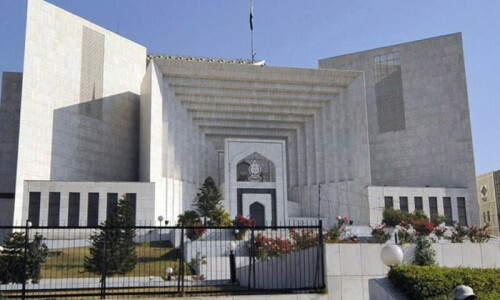ISLAMABAD, March 25: A former chairman of the Higher Education Commission (HEC) and incumbent president of the Pakistan Academy of Sciences, Dr Attaur Rehman has criticised the government's decision to devolve the commission to the provinces.
Dr Rehman, the commission's founding chairman who held the position from 2002 till late 2008, said at a press conference here on Friday that the decision would be a blow to the country's higher education sector which had just started taking off after the huge investment that went into it over the past decade.
“Splitting the HEC between the provinces means we are pushing our higher education sector 40 years back because they neither have the capacity nor vision to take their universities to the competitive level of 21st century.”
He said that although the HEC's status had been protected under the 18th Amendment as a subject of the federal legislative list, some elements were bent upon destroying the institution so important to the national development.
Dr Rehman said the implementation commission on 18th Amendment, headed by Senator Raza Rabbani, was being 'misled' on the HEC's status. The commission directly fell under the prime minister's control, but it was being dealt as a subsidiary of the federal education ministry, he added.
When asked if the HEC or the Pakistan Academy of Sciences had been formally informed about the decision to devolve the commission to the provinces, Dr Rehman quoting some reliable sources said the implementation commission had recommended devolution of the HEC and its announcement was just a matter of time.
He said he had already written to the president, prime minister and Mr Rabbani and informed them about the possible implications of the HEC's devolution to the provinces.
Some vice-chancellors of private and public sector universities were present on the occasion.
When contacted, Begum Shahnaz Wazir Ali, a PPP MNA who has worked as adviser to the prime minister on social sector and looked after the HEC's affairs for some time, said that until the government came up with a definite devolution plan for the commission it would be premature to comment on the matter.
However, she said, if the HEC had any concern it should make a presentation to the implementation commission. She was of the view that setting up of new universities, degrees' verification and quality assurance in terms of new degree programmes were some of the tasks that should be handled at the central level.
“Universities falling under the administrative control of provincial governors as their chancellors are already being managed at the provincial level and large public sector higher education institutions have their own senates and syndicates for governance purpose,” she pointed out.
PML-N leader Ahsan Iqbal, who as a member of the constitutional reforms committee had submitted a dissent note against devolution of the federal education ministry, said the devolution of the HEC would be a disaster for the higher education sector. He said that all over the world countries had national-level institutions responsible for standardisation of education.
“I opposed the devolution of the federal education ministry on the grounds that it will promote provincialism because every province will have separate curriculum and examination systems to follow,” he said.
Mr Iqbal said that India which is far bigger country than Pakistan has a national-level examination system in addition to a university grants commission.
Despite repeated attempts, Senator Rabbani could not be contacted for his comment on the issue.














































Dear visitor, the comments section is undergoing an overhaul and will return soon.